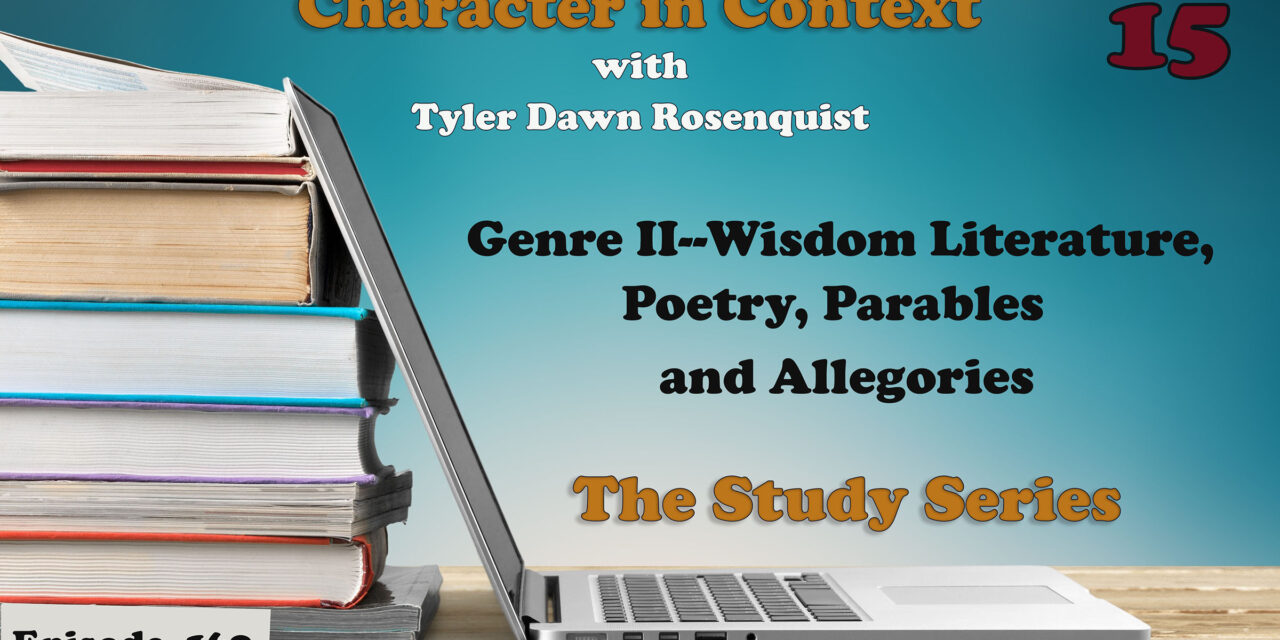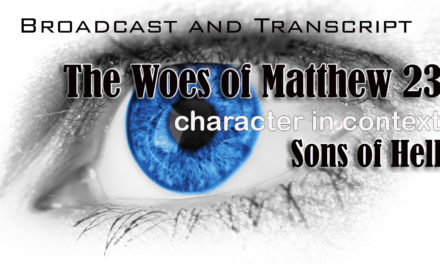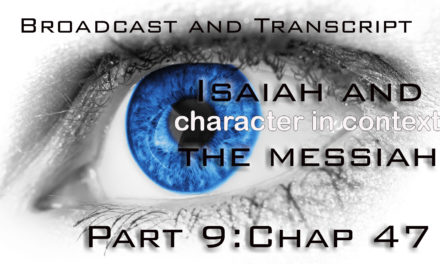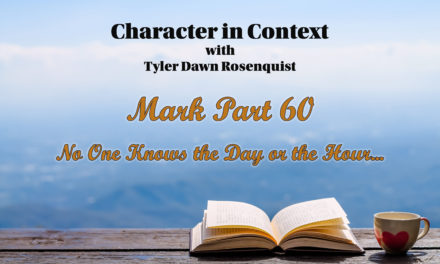Alonso Schökel once said that “what has been written with imagination must be read with imagination,” and although we completely understand the difference between reading one of Shakespeare’s sonnets and Shirer’s Rise and Fall of the Third Reich, we tend not to do that with Biblical poetry, which makes up roughly a third of the Hebrew Scriptures. We have the same problem when we don’t understand the original purpose of wisdom literature in general, and parables and allegories. Learning how to read these will revolutionize your Bible studies.
If you can’t see the podcast player, click here.
Hi, I am Tyler Dawn Rosenquist and welcome to Character in Context, where I usually teach the historical and ancient sociological context of Scripture with an eye to developing the character of the Messiah. But not right now, right now I am doing a series about how to not waste your time with bad study practices, bad resources, and just the general confusion that I faced when I started studying the Bible and was trying to figure out what to do and whose books I should read. Bottom line, I read a lot of nonsense and spent a ton of money on it. I am going to give you some basics on how to avoid a lot of the pitfalls, save money, maximize your time and effort, and get the most out of what you are doing.
My master book list can be found on my website theancientbridge.com here and I will add to it as needed. Scripture this week comes from the CSB, the Christian Standard Bible.
Apart from reading apocalypses as predictive prophecy or as a narrative, I would say that the second most damaging misuse of Scripture comes from not understanding how the wisdom literature of the Bible was meant to be read. Now, wisdom literature is specifically an ancient Near Eastern phenomenon—meaning ancient Israel and its immediate neighbors from Egypt to Assyria and Babylonia. It’s just exactly what it sounds like, the collected sayings of sages (aka wise men) which were developed and later written down primarily in order to teach wisdom to kings, princes, and judges. Wisdom literature serves as a blessing within the culture in which it was written. Or at least it does if it is used correctly. In addition to much of Exodus, Leviticus, parts of Numbers and Deuteronomy, we should also include Proverbs, Ecclesiastes, Psalms, Job, and the Song of Solomon. In addition, extra-Biblical works such as Ecclesiasticus, written during the Greek occupation, and Pirke Avot from the Talmud are very much classified in the same genre. And because these were all written at wildly different times and with different goals in mind, we will find them disagreeing with each other and even with reality as we know it. Why is that? Because wisdom literature tends to deal with absolutes and/or with ideal situations. We all know that the sons of the righteous sometimes have to beg for bread. And the wicked don’t always prosper but sometimes they really, really do. And the people who wrote the sayings and the people who read them understood the difference between a list of things that are absolutely true as opposed to a list of things that really would be true in a perfect world. In a perfect world, however, we wouldn’t need wisdom literature to try and guide us away from abject foolishness.
Ah, and that is an important term to understand—the meaning of foolish and, actually wise as well. A person with wisdom is one who knows their place, their strengths and weaknesses, and acts accordingly in order to stay on the righteous path. A fool doesn’t know his or her place, and has no conception of their true nature, abilities, or limits and is constantly getting into trouble. A wise person can be uneducated and poor, and a fool can be educated and rich. A fool is easily convinced of nonsense whereas one who is wise is not quick to jump to conclusions. A wise person sits down and figures out whether they have the means to build that tower or go to war against that enemy before setting out but a fool leaps before they look and end up as a mockery. Proverbs 17:12 is an excellent example which tells us that a wise servant will rule over a foolish son and will inherit with his brothers. The Bible teaches us that wisdom is not about elitism because the elite are more than capable of being fools—just look at wise Abigail’s foolish husband Nabal! So, just remember that wisdom isn’t a matter of status or education, gender or birth. Wisdom is about a person who knows their place in the grand scheme of things and does well—Joseph is probably the best example or at least when he was in Egypt. Foolishly bragging about his dreams to his brothers and tattling on the sons of his father’s concubines landed him in hot water. But his wisdom in Egypt got him promoted three times despite the injustices he faced. His wisdom was the difference between life and death for a multitude in his time.
Now, I am going to pick on the Prosperity Gospel here because they have this thing about taking wisdom sayings and presenting them entirely out of context as rules—so that people who are honest and poor are seen as somehow deserving it while the people with the wealth have favor. This, despite the fact that both Yahweh and Yeshua are presented by not only the Prophets but by their own words as favoring the vulnerable, oppressed, wrongly imprisoned, widows, orphans, poor, needy, etc. And this was the foolishness of Job’s buddies—they believed that nothing bad happens to anyone who doesn’t have it coming and no matter how Job protested his innocence, they were coming up with the worst crimes to accuse him of committing in secret. In secret because they hadn’t ever seen him do anything wrong, of course and thus had no just cause for accusation. But the belief that bad things only happen to the deserving is a very ancient, very pagan idea. Throughout the Bible, terrible things happen to some really faithful people. Righteous women are barren while wicked women are having kids right and left. We all know, once we sit down and think about it, that life is unfair and even being one of God’s “favorites” isn’t going to save you from people stoning you to death, or at least trying to. For that matter, it won’t even save you from crucifixion. I mean, just ask believers in the Congo and Iran and China about the Prosperity Gospel and see what they have to say. The Bible, as a whole, shows us a complex world where the only prosperity and victory that believers are guaranteed is spiritual and in the world to come.
So, remember, when we are reading wisdom literature, it was given to us in order to be edifying and useful. This is exactly what the Scripture tells us in 2 Timothy 3:14-17: “But as for you, continue in what you have learned and firmly believed. You know those who taught you, and you know that from infancy you have known the sacred Scriptures, which are able to give you wisdom for salvation through faith in Christ Jesus. All Scripture is inspired by God and is profitable for teaching, for rebuking, for correcting, for training in righteousness, so that the man of God may be complete, equipped for every good work.” People like to focus on what “inspired by God means” but let’s look at the intention of it—the intention is imparting wisdom, which is profitable for all manner of good works. Even the weird stuff, in context, imparts wisdom when we know how to read it and divide it properly. Out of context, it can lead to a lot of foolishness. These aren’t magic words but inspired words—big difference. That the words are inspired means that we must pay attention to the context and the full meaning because God didn’t deliver anything to us in the form of discrete memory verses. So when we read Job, we shouldn’t read it as just a narrative story talking about the hard times of Job—it was meant to be mined for wisdom and it also serves as a primer against the type of foolishness Job’s friends offered him. No one was ever supposed to read Job in order to prove he was a real guy but to gain wisdom. Nor does it matter who wrote the Proverbs, only that they were given to us in order to guide us and make us wise—recognizing that some of it was a lot more useful to the original audience than it is to us. The Proverbs 31 woman had servant girls to feed whereas I have appliances that simply need maintenance once in a while!
So how about poetry? Do we read poetry the way we would read the account of the crossing of the Red Sea? Of course not. The songs of Moses and Miriam are meant to be appreciated as art, right? And we understand that. No one reads a Robert Frost poem in the same way that they would read a Presidential biography or a cookbook. We change our mindset when we know we are reading poetry. We look for similes and metaphors and flowery descriptions and to be inspired to praise God or to lament or to celebrate. Truly the only rule about poetry is that there are few rules—it can be anything and everything and yet we know it when we see it. The Psalms constitute the most famous poetics in the world. But we also find poetry in the Song of Solomon, Job, Ecclesiastes and in the prophets as well. Many Bibles will actually ident the poetics so that we can see them better—being that they aren’t nearly as poetic in English! Lamentations is entirely poetic. Poetry is very different from narratives as they didn’t write narratives (the story-telling genre) in order communicate emotions. Whereas modern narratives such as Lord of the Rings or The Bridge Over the River Kwai are very emotionally moving because they talk about how people are feeling as part of the normal story-telling process, the Bible only sometimes talks about emotions and thoughts—like Jacob mourning for Joseph. But the poetic works of the Bible are full of emotion and even use the first person “I” which we do not see in the narratives except in dialogue. It just wasn’t the way they wrote. The prophets, when they cry out and warn and mourn, it is often in poetic form. When we read poetry, it is important that we don’t try to literalize everything.
I love what Alonso Schökel said about Biblical poetry–“What has been written with imagination must be read with imagination.” Words in the poetry of the Bible, as well as combinations of words, can mean radically different things than they mean in the historical narratives. And the same is true with the poetry of Shakespeare—common words can be used in imaginative ways that force us to think out of the box and if we don’t, we just won’t get the full effect or we will come to some very wrong conclusions. I am going to link a wonderful article by Knut Heim that I hope you will read because he has a number of excellent examples of how the poetry of the Bible is misused and misunderstood, even being used to justify genocide. Let’s look at an example that he brought up from the end of Psalm 137, which no one really likes to preach from.
“Daughter Babylon, doomed to destruction, happy is the one who pays you back what you have done to us. Happy is he who takes your little ones and dashes them against the rocks”
Okay, dang. This is the poster boy for imprecatory psalms. An Imprecatory psalm is a psalm that is devoted to calling down judgment and curses on one’s enemies or God’s enemies and dang, this one sure as heck qualifies. And it is deeply disturbing but it was written with imagination and so must be read with imagination. First of all, despite the fact that very few people would want a baby to suffer for the sins of a country, no matter what they have done, we can all relate to the desire for absolute retaliation in the face of a traumatic event. Even if we don’t really mean it and would never do it in real life—we might fantasize about it. Reading it in historical poetic context, we see from many other examples in the Bible refer to cities as women, daughters, and especially mothers. The citizens are the sons, daughters, and little ones. A city whose citizens have all been hauled away is referred to as a mother who has lost her children and mourns for them. And so, this particular Psalm isn’t making the killing of enemy babies a holy thing (despite how the Nazis interpreted it) but is calling for retributive justice—the sacking of Babylon and that they would be treated exactly the same as the residents of Jerusalem were treated. It uses a cultural image of enemy soldiers removing the babies from the mothers and brutally killing them to serve as a metaphor for the vengeance they want God to take out on the people who did far worse than the simple judgment the nation had earned for their idolatry, oppression, and immorality. When used properly, it is gut-wrenching but familiar to those suffering persecution by the State. When read out of context as a mandate and as permission to commit abominable crimes against humanity, it becomes very dangerous and very unscriptural.
Bottom line, poetry taken at face value isn’t being read as poetry. We wouldn’t do that with any modern poet—we would search for the deeper meaning and we would look into their time period and culture so as not to make fools out of ourselves. Let’s look really quick at Emily Dickinson and what happens if we read her in an unimaginative way,
“I taste a liquor never brewed —
From Tankards scooped in Pearl –
Not all the Frankfort Berries
Yield such an Alcohol!
Inebriate of air – am I –
And Debauchee of Dew –
Reeling – thro’ endless summer days –
From inns of molten Blue –
When “Landlords” turn the drunken
Bee Out of the Foxglove’s door –
When Butterflies – renounce their “drams” –
I shall but drink the more!
Till Seraphs swing their snowy Hats –
And Saints – to windows run –
To see the little Tippler
Leaning against the – Sun!”
So, an unimaginative reading would assume that this is about drinking liquor, right? But then we look at her life and how she refused to marry or live a normal matronly life, and she instead loved and embraced freedom in poetry and the outdoors. This is an ode to the path not taken by most, a life unappreciated and unapproved of, but she is talking about the joy she has in this life that can’t be described except imaginatively. So, when we read the poetry of the Bible, we must go below the surface and expand our minds so that we can receive the wisdom hidden there.
Parables are also very familiar to readers of the Gospels, but often misunderstood and misused. I actually have a longer teaching I did on them in their Jewish context years ago. Parables are meant to be understood on a number of different levels. They are designed, more than anything, to inspire deep thought and questions. If a person believes that a parable is easy to understand, they have likely already been given an interpretation or are reading it wrong. When scholars discuss parables, they will come away with so many different insights and interpretations because that was the whole point of parables. If we try to read them as narrative stories about real events, we are reading them wrong. If we are reading them in order to develop doctrines about heaven, hell, or rapture, then we are reading them wrong. If parables don’t bother us in some way or another, then we are reading them wrong. Parables don’t impart truly deep wisdom from a shallow reading—which is why they were such a popular teaching method and why we are so transfixed with them to this day and always will be. Let’s look at the six rules of parables:
(1) A parable is a story concerned with teaching a moral, usually one that is spelled out. Think Aesop’s fables. (2) Parables describe a vague reality or pseudo-reality, without oftentimes being at all realistic. King parables are notorious for being unrealistic. (3) The moral often has zero to do with the parable itself, a fact which is ignored by the audience, who are expected to be entertained by the story, which in turn makes them willing to accept the moral even if it has nothing to do with the story. (4) The same parable can be used by two different teachers to say completely opposite things. (5) Parables cannot be used to develop specific doctrines because they are generally not realistically describing situations but instead teaching through metaphor and other literary devices. And sometimes very questionable metaphors by modern standards. (6) Parables rely on hyperbole and exaggeration—often saying something that isn’t true, and recognized by the audience as untrue, in order to make a point. “What doesn’t kill you makes you stronger.” Or “The Customer is always right.” The deal is, we have to suspend a certain amount of reality in order to take away a lesson from a parable or fable. If we are too literal or too nitpicky, the whole lesson falls apart.
Let’s look at the parable of the mustard seed: “The kingdom of heaven is like a mustard seed that a man took and sowed in his field. It’s the smallest of all the seeds, but when grown, it’s taller than the garden plants and becomes a tree, so that the birds of the sky come and nest in its branches.” (Matt 13:31-32) Yes, the mustard seed is small, but only proverbially. There are smaller seeds, but it was a recognized cultural way of talking about something small that everyone could relate to because they had all seen mustard seeds. The mustard plant also isn’t so big that it can be compared to a tree and would not hold many birds and their nests. But the point of the parable of the mustard seed wasn’t to be a science lesson. The way it was stated was meant to produce a dramatic visual picture about a mustard plant on steroids which became a huge tree that even the birds could nest in, which would be quite a sight! After all, the Kingdom of Heaven, were it a plant or a tree, would certainly be out of the ordinary and larger than life, right? And what about the birds? Birds throughout the Bible often refer to the nations, which would flock to this abnormally large and abundant Kingdom. But most would just hear it as talking about Isaiah’s vision of nations pouring into Jerusalem in the world during the coming Messianic reign, bringing tribute. Certainly not including them in the holy people—which is obvious to us living on the other side of the Empty Tomb and the Missionary trip to the house of Cornelius.
And the last thing we will be discussing today is the allegory. An allegory is an artistic expression where one says this but they are really talking about that. If you have read Animal Farm by George Orwell, you know that it wasn’t just a fictional story about a bunch of animals who took over the farm and where some got uppity. Animal Farm is a scathing social commentary on Communism. The Russian Revolution of the early 20th century represented a great experiment of the common, impoverished people rising up against the excesses of the Tsar and his government. In fact, this is the era in which Fiddler on the Roof was written and provided the setting for it with the brutality of the government and the poverty of the citizenry, as well as the pogroms against the Jews in particular. Many Jews and Gentiles hoped that by overthrowing the government, they would create a perfect society where all would share what they had in common (as we see in the Book of Acts), but poor revolutionaries are often closeted power-mongers. George Orwell was a young man during the revolution and he expressed his disgust with the failure to realize the great dream that was fought for by writing Animal Farm—where the pigs represented those who had preached equality but who later became just as corrupt as the system they replaced and even moreso in some ways. Each animal on the farm represents certain types of people who fought and were caught up in it.
In the Bible, we have allegories as well. The Gospel of John and especially chapter 14 is full of them—specifically relating to stories of sheep and the good shepherd. And frankly, this is one of the reasons I detest the term “sheeple”. We are represented as sheeple in the Bible, guys. It’s a positive picture—don’t allow secularists to cloud the narrative! In Galatians 4, we have the allegory of Sarah and Hagar and their children which is very difficult to understand if you are trying to make sense of it historically. To have Hagar representing the Law and Ishmael representing the Jews who do not accept Yeshua, while Sarah represents freedom from works based righteousness and Isaac the worldwide believing community? In an allegory you have to step back and allow for a lot of what is called suspension of disbelief because it isn’t a perfect comparison but it isn’t supposed to be. It’s an allegory and the positive associations we have with Sarah and Isaac are supposed to set the stage for looking positively at whatever Paul is comparing them to. Whereas no one wanted to be a slave or a child of Ishmael. And this had nothing to do with how badly Sarah treated Hagar and it is no reflection of Hagar as a human being. It was simply about freedom vs slavery and drawing on the image of a beloved matriarch and patriarch. When we try and get too technical, we abuse the allegory and will lose the meaning.
I am going to tie this up by repeating that all of the genre styles I have talked about today were written imaginatively and must be read imaginatively. That’s what wisdom literature is all about.






















I enjoyed Knut Heim’s article, he is readable. Ta 🙏